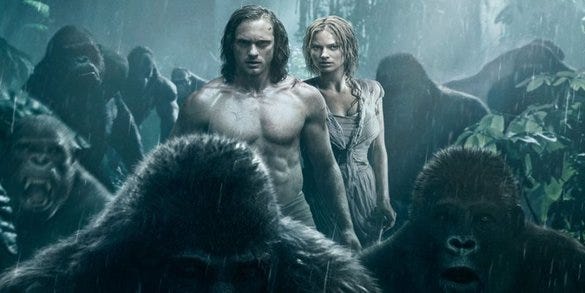The Legend of Tarzan
"The Legend of Tarzan" has been in development for 13 years. It should have stayed in the oven a little longer. It is fundamentally middling, an actioner with a non-committal social conscience that drags the entire narrative to a screeching halt. This waffling nature extends to its characters, its action, its basic story. There is nothing insultingly bad about “Tarzan”; you won't walk out. It's the kind of movie you'll pass at a Redbox in six months and wonder “Hey, when did that come out?”

The most notable example of how “The Legend of Tarzan" doesn't stick the landing is in how it handles the issue of race in the Tarzan narrative. This problem is emblematic of the movie's other problems. Tarzan is a colonialist character. His origin – the child of two British nobles who shipwrecked in Africa and perished, leaving him to be raised by apes – is borne out of a very specific time in world history. In today's culture – increasingly, and rightfully, socially aware – these are aspects of the character (white nobleman who goes and saves native peoples from their foes; insensitive depictions of native peoples) that cannot go unaddressed. How does “Legend” do it? By incorporating real-life civil rights activist George Washington Williams (Samuel L. Jackson) as a sidekick for Tarzan (Alexander Skarsgård). The real GWW was responsible for revealing the Belgian slave trade in the Congo, and in “Legend” he's a secret envoy from the United States Government sent to use Tarzan to sneak into the Congo to reveal it.
It's a surprisingly strange and dorky way to handle colonial racism within the Tarzan narrative because it is built for an American understanding of racism, as always cast through the prism of our original sin of slavery. But slavery is only one component of colonial racism and not the main one the traditional Tarzan narrative peddles. Rather, Tarzan, as a story, is much more guilty of the “white savior” narrative, of depicting native peoples as less capable of their own environments than the white man who enters and conquers it. And while “Legend” provides some minor character work to the African tribe Tarzan calls home, it never really ameliorates the feeling of “white savior” from the story. It brings in GWW to help Tarzan stop slavery in the Congo; but the narrative is so lax and disjointed that Tarzan is, ultimately, the most important force of change for the Congo.
Writers Adam Cozad and Craig Brewer may have a great script out there, one that tones down the “white savior” aspect and brings nuance to the story, but it does not shine through here. The narrative is too disjointed as a whole. The villain is Léon Rom (Christoph Waltz), a Belgian politician who wants to enslave the Congo and steal their diamonds. He teams up with Chief Mbonga (Djimon Hounsou), the leader of a rival African tribe who wants Tarzan dead. Mbonga agrees to give Rom big diamonds if Tarzan is brought to him. We learn through occasional flashbacks that Tarzan killed Mbonga's son. During his final confrontation with Mbonga, Tarzan atones for the murder, although the weight of that murder is not felt until that scene and that scene alone. So you have villainous Africans who need to learn to forgive Tarzan a sin, heroic Africans who need saving by Tarzan, and nasty white Europeans who are ultimately turned away from their African interests when Tarzan saves the Congo. So it handles race without grace; what about gender?
Margot Robbie shows up as Jane, Tarzan's wife. She refuses to let him travel to Africa alone because she is her own woman who makes her own choices and who grew up in Africa, too. Casting Margot Robbie, whose history of playing breathtaking women who don't give a shit, implies Jane won't be a damsel in distress this time. She even says, after being captured by Rom, “I'm not going to be a damsel in distress.” Well, she is. That's about it for her.
Perhaps the worst thing about Tarzan falling into these narrative traps is that it is unfailingly self-aware at every juncture. Jane jokes about not being a damsel in distress (and is). GWW describes the entire Tarzan backstory. Rom continually jokes about classic Tarzan tropes ("You Jane, he Tarzan"). That self-awareness is grating when it becomes clear the narrative suffers from blindness beyond the tropes; it tries so hard to apologize for itself and its fundamental flaws that it forgets to tell a story without them.
Jackson, Hounsou, Waltz, Robbie? That's a triple-A cast. Unfortunately, there is one member who doesn't deserve that grade: Skarsgård as the titular hero. He mopes, looks big, mopes some more. It's hard to tell whether this is Skarsgård lacking range or just the script failing him completely. Skarsgård is hot and, I'm sure, very talented, so I'm willing to blame the script. I mentioned above that we don't actually get a clear idea of what drives him in his conflict with Mbonga until that conflict comes to a head, and for the most part we don't understand him as a character for the entire movie.
For a character fundamentally rooted in colonial mores, "Tarzan" takes pains to acknowledge the more visible forms of racism in our past but lazily indulges in the much more prevalent and harmful narrative structures of its genre. It is a movie that means well but misses the point completely. Too much of it is in 2D, underdeveloped. It isn't an insulting bore like other movies this summer (cough, "Independence Day: Resurgence," cough), but it is nothing worth leaving your house for and a disappointing revival of a character with enormous potential.


